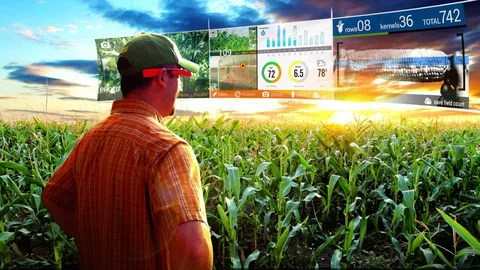Introduction to the Future of Food and Technology in Agriculture
The future of food is intrinsically tied to technological advancements in agriculture. This article explores the transformative impact of technology on farming practices and the global food supply chain.
Precision Agriculture: Revolutionizing Farming Practices
- Sensors and IoT in Agriculture: Precision agriculture utilizes sensors and Internet of Things (IoT) devices to collect real-time data on soil conditions, crop health, and weather, enabling farmers to make data-driven decisions.
- Drones and Satellite Imagery: Drones and satellite imagery provide a bird’s eye view of farms, facilitating crop monitoring, yield predictions, and the identification of potential issues.
Artificial Intelligence in Crop Management
- Predictive Analytics for Crop Yields: AI algorithms analyze data to predict crop yields, optimizing planting schedules and resource allocation.
- Automated Pest Detection and Management: AI-powered systems detect pests early, allowing for targeted and efficient pest management strategies.
Vertical Farming and Controlled Environments
Vertical farming leverages controlled indoor environments, enabling year-round production with minimal space requirements. Soilless farming methods like hydroponics and aeroponics optimize water usage and nutrient delivery, promoting sustainable agriculture.
Robotics and Automation in Agriculture
Robotics and automation enhance efficiency by automating tasks such as plowing, planting, and harvesting. Robots equipped with computer vision technology identify and eliminate weeds, reducing the reliance on herbicides.
Blockchain in the Food Supply Chain
Blockchain technology ensures transparency and traceability in the food supply chain, allowing consumers to track the journey of their food from farm to table. : Blockchain helps in quickly identifying and isolating contaminated food products, enhancing overall food safety.
Gene Editing and Biotechnology
Gene editing techniques enhance crop resilience to environmental stressors, leading to more robust and adaptable crops. Biotechnology contributes to the development of crops with enhanced nutritional profiles, addressing global malnutrition challenges.
Challenges and Ethical Considerations
The widespread adoption of agricultural technology raises concerns about its environmental impact, including energy consumption and waste generation. Ensuring equitable access to technology in agriculture is a challenge, with potential disparities between large and small-scale farmers.
Positive Impacts on Sustainability
Agricultural technology enables precise resource management, optimizing water, fertilizer, and pesticide use. Sustainable farming practices, facilitated by technology, contribute to reducing the environmental footprint of agriculture.
Future Trends in Agricultural Technology
The integration of 5G technology enhances connectivity in rural areas, enabling real-time data transmission and communication. The development of sophisticated farm management software further streamlines operations and decision-making.
Social and Economic Implications
Automation in agriculture may lead to job displacement, necessitating the development of new skills for the workforce.The adoption of agricultural technology creates economic opportunities in research, development, and the tech-agriculture sector.
Global Collaboration in Agricultural Innovation
Global collaboration is essential for sharing knowledge, expertise, and resources to address global food security challenges and accelerate agricultural innovation.
Consumer Perspectives on Tech-Enhanced Agriculture
Educating consumers about the benefits of technology in agriculture is crucial for fostering awareness and acceptance. Highlighting how technology enhances sustainability, food safety, and nutritional quality helps consumers make informed choices.
Regulatory Frameworks and Standards
Establishing regulatory frameworks and ethical guidelines ensures responsible and ethical use of technology in agriculture, addressing potential risks and ensuring accountability.
Conclusion
In conclusion, the future of food is intertwined with the integration of technology in agriculture. As innovative solutions continue to emerge, striking a balance between technological advancements, sustainability, and ethical considerations is vital for ensuring a resilient and food-secure future.
FAQs
How does precision agriculture utilize technology for better farming practices?
Precision agriculture utilizes sensors, IoT devices, drones, and satellite imagery to collect real-time data for informed decision-making in farming practices.
What role does blockchain play in the food supply chain?
Blockchain ensures transparency and traceability in the food supply chain, allowing consumers to track the journey of their food from farm to table, improving overall food safety.
How does agricultural technology impact sustainability?
Agricultural technology contributes to sustainability by optimizing resource use, reducing environmental footprints, and promoting sustainable farming practices.
What are the social and economic implications of automation in agriculture?
Automation in agriculture may lead to job displacement, requiring the development of new skills, while also creating economic opportunities in the tech-agriculture sector.






